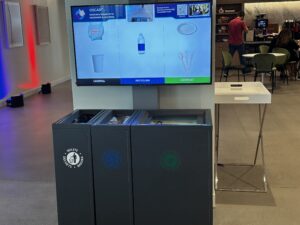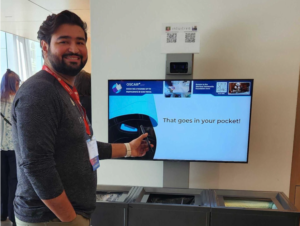
Guest Post by Brian Sano, Head of Strategic Growth at Intuitive AI
There has been a noticeable shift in the events industry towards sustainability. As concerns about climate change and environmental impact continue to rise, event organizers and attendees are increasingly prioritizing eco-friendly practices.
This growing demand for sustainability in the events space was recently highlighted by not one, but two sustainability sessions at the sold-out Meeting Professionals International Northern California Chapter (MPINCC)’s ACE event in San Francisco.
We’ll delve into the significance of this trend and explore numerous options for making a difference in this evolving landscape.
Events Can Often Leave a Large Carbon Footprint
The events industry is no stranger to environmental challenges. From excessive waste generation to high energy consumption, traditional events often leave a significant carbon footprint.
However, with greater awareness and a collective commitment to change, the industry is now embracing sustainable practices with renewed vigor. As event professionals, it’s our responsibility to adopt sustainable strategies that benefit the planet and enhance the overall event experience.
Related: Events and Conferences Focus on Experience
“The math speaks for itself – if there are 500 people attending an event and each one uses a new single-use coffee cup plus a lid and a plate, fork, knife and water bottles twice a day, this easily comes to 500 x 12 = 6,000 pieces of single-use plastic DAILY at the event, said Marissa Jablonski, CEO of EcoSystem Strategies. “If the event is a long weekend, this could become 18,000 very quickly.”
An Innovative Solution for Improving Sustainability
One company that is leading by example is Intuitive AI and its Oscar Sort solution. Their innovative and experiential approach to circularity and sponsorship had MPINCC ACE attendees buzzing.
Have you ever stood before a waste bin and wondered where to put that item? Wonder no more. Oscar Sort uses AI to detect the items and tell folks where to put their waste.
Just hold an item up in front of the screen, and a camera scans it and tells you which bin to use: Compost, Recycling, or Landfill.

An Oscar waste shorting screen sits atop three containers designated as Landfill, Recycling, and Compost.
This simple yet effective intervention not only encourages attendees to properly sort their waste, but it also exposes them to sponsor advertisements and opportunities to win rewards.
It even has some Witty commentary built into its system for when attendees inevitably try to take a picture of Oscar with their phones (the very definition of Shareable): The camera scans the phone and responds with “That goes in your pocket!”

Intuitive AI CEO & Co-Founder Hassan Murad Showing Oscar his phone.
Sustainability at Events: Results
Some venues go to great lengths to manage waste effectively. Picture this: teams of dedicated individuals sifting through bags of discarded items that attendees have tossed, manually sorting materials to ensure they end up in the right bins.
For those individuals, it’s a time-consuming and thankless responsibility they’ve taken on to drive sustainability.
Other venues have fallen short, with a significant portion of materials ending up in landfills due to contamination.
While most venues struggle to achieve a mere 20% to 30% sorting accuracy from attendees, Oscar Sort often pushes sorting accuracy rates above 80%.
Why Sustainability at Events Matters
Why is sustainability in events so important, and how does it benefit organizers, venues, and attendees?
First, adopting sustainable practices helps event organizers reduce costs in the long run. By minimizing waste and optimizing resource usage, they can achieve savings while also demonstrating their commitment to the planet.
Moreover, hosting sustainable events enhances brand reputation and makes a positive environmental impact.
“It is critical as planners and suppliers that we align with the goals and values of our clients and their customer-facing commitments,” said Jablonski. “The vast majority of US corporations have green initiatives that are core to their metrics and messaging.”
For venues, the demand for sustainable solutions is rapidly expanding, and the capacity of properties to meet these expectations will significantly influence their ability to secure opportunities.
For attendees, sustainability offers a chance to connect with brands and organizations that share their values. The attendees feel a sense of connection and purpose, enhancing their overall event experience.
“Attending a waste-free event makes a guilt-free, feel-good environment for all,” said Jablonski.
More Sustainability Opportunities at Events
Here are some other ways event planners can decrease their environmental footprint from a design and audiovisual perspective, according to Jonathan Martin, principal designer at ShowTec, Inc.:
- Work with production partners to use low-energy, high-efficacy technologies like Automated LED lighting fixtures that will minimize the quantity of fixtures required
- Look for venues with energy-efficient house lighting systems that are dimmable
- Look for efficient and direct load in/load out access to minimize use of machinery like forklifts and unnecessary labor that needs to commute to the venue
- Identify AV equipment empty storage near general sessions to eliminate the need to reposition, reload and offload empty case trucks
- Work with clients and production partners to identify durable and reusable scenic assets that are designed using lightweight sustainable construction materials
Jablonski added that meals are often responsible for the most waste during an event. In order to reduce waste, she suggests:
- Compost food waste into soil (can be an outside composting company or on-site composting)
- Serve food on washable/reusable plates
- Serve beverages in glasses/mugs from recyclable dispensers (metal or glass)
- Offer metal cutlery and cloth napkins
Conclusion
The growing demand for sustainability in the event space is a testament to an environmentally conscious world. Event planners, venues, vendors, and technology providers must work together to implement eco-friendly practices and minimize environmental impact.
Brian Sano is Head of Strategic Growth – “Special Projects Team” at Intuitive AI. He is also a father, a spouse, a son, a brother, and an ally that’s focused on championing initiatives that drive positive change for the environment and humanity.
Main image by onehundredseventyfive from Pixabay. Oscar image by Dan Gingiss. CEO image by Brian Sano.
Did you know? Dan Gingiss has committed to offsetting carbon emissions for all of his flights to events during the year.
